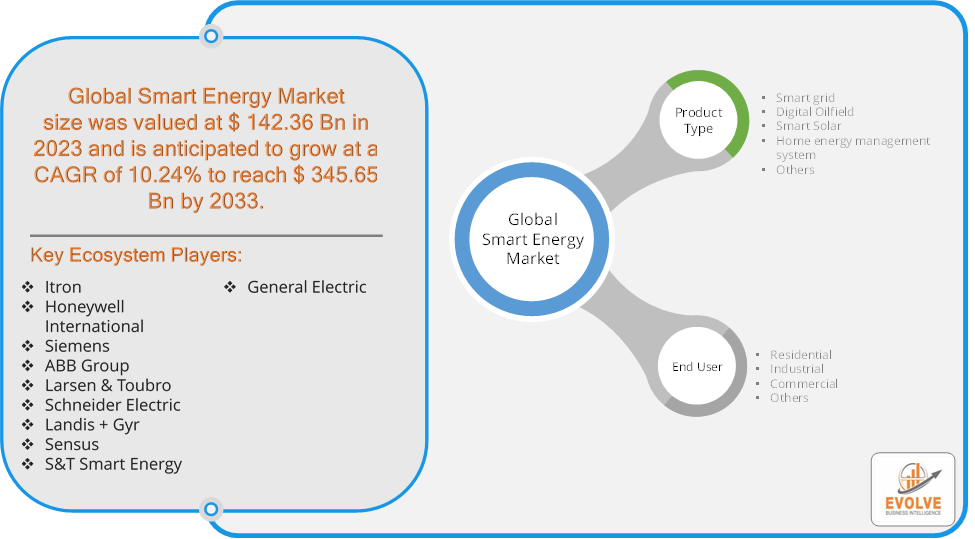Smart Energy Market Surges: 10.24% CAGR

Evolve Business Intelligence has published a research report on the Global Smart Energy Market, 2023–2033. The global Smart Energy Market is projected to exhibit a CAGR of around 10.24% during the forecast period of 2023 to 2033.
Evolve Business Intelligence has recognized the following companies as the key players in the global Smart Energy Market: Itron, Honeywell International, Siemens, ABB Group, Larsen & Toubro, Schneider Electric, Landis + Gyr, Sensus, S&T Smart Energy and General Electric.
 More Information: https://evolvebi.com/report/smart-energy-market-analysis/
More Information: https://evolvebi.com/report/smart-energy-market-analysis/
Market Highlights
The Global Smart Energy Market is projected to be valued at USD 345.65 Billion by 2033, recording a CAGR of around 10.24% during the forecast period. The Smart Energy Market refers to the industry focused on the development and implementation of smart energy solutions that utilize advanced technologies to optimize the production, distribution, and consumption of energy. This market encompasses a wide range of products and services aimed at enhancing the efficiency, reliability, and sustainability of energy systems.
The smart energy market is driven by the increasing demand for sustainable energy solutions, government regulations promoting energy efficiency, and the rising adoption of Internet of Things (IoT) technologies in the energy sector. It aims to create a more resilient and efficient energy system that can support the transition to a low-carbon economy.
The COVID-19 pandemic had a significant impact on the Smart Energy Market. Many smart energy projects faced delays due to disruptions in the supply chain, restrictions on movement, and financial uncertainty. This affected the deployment of smart meters, grid infrastructure upgrades, and renewable energy installations. With lockdowns and remote working becoming the norm, there was a noticeable shift in energy consumption patterns. Residential energy demand increased, while commercial and industrial demand declined. This shift challenged energy providers to adapt quickly, highlighting the importance of flexible and responsive energy systems. The pandemic accelerated the adoption of digital technologies as utilities and energy companies sought to improve remote monitoring and management of energy systems. The pandemic underscored the need for resilient and sustainable energy systems, driving interest in renewable energy sources and smart energy solutions. Utilities faced operational challenges due to workforce restrictions but also saw opportunities to enhance customer engagement through digital platforms and smart energy solutions.
Segmental Analysis
The global Smart Energy Market has been segmented based on Product Type and End User.
Based on Product Type, the Smart Energy Market is segmented into Smart grid, Digital Oilfield, Smart Solar, Home energy management system and Others. The Smart grid segment is anticipated to dominate the market.
Based on End User, the global Smart Energy Market has been divided into Residential, Industrial, Commercial and Others. The Industrial segment is anticipated to dominate the market.
More Information: https://evolvebi.com/report/smart-energy-market-analysis/
Regional Analysis
The Smart Energy Market is divided into five regions: North America, Europe, Asia-Pacific, South America, and the Middle East, & Africa. North America region has a well-established smart energy market, driven by policies promoting clean energy and a robust technological ecosystem. The focus here is on smart meter deployment and grid modernization. Europe is another mature market for smart energy, with a strong emphasis on renewable energy integration and energy efficiency. Government support and regulations are helping to accelerate the adoption of smart energy solutions. Asia Pacific region is expected to see the fastest growth in the Smart Energy Market. Rapid urbanization and a growing need for reliable energy are driving the market forward. Significant investments from governments in countries like China and India are fueling large-scale smart grid implementations and renewable energy ventures. In Latin America region is growing interest in renewable energy sources, particularly solar and wind power. Emerging market for smart grid technologies and energy efficiency solutions and increasing focus on reducing energy losses and improving grid reliability. In Middle East and Africa region, increasing focus on diversifying energy sources and integrating renewables. Emerging market for smart grid and energy management technologies and growing urbanization and industrialization driving energy demand.
